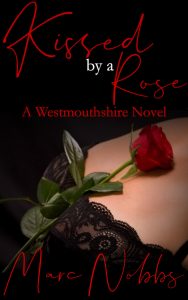A couple of weeks ago, I mentioned that I’ve been experimenting with the various AI platforms available, and it’s been quite an eye-opening experience. Today, I’d like to share my thoughts on the process and whether I think it’s a worthwhile exercise for writers.

Using AI as a Beta Reader
I began by asking ChatGPT to analyze A Good Man on a chapter-by-chapter basis, which I found quite useful. I then tried the same process with Google Gemini, focusing on Kissed by a Rose. My goal was to have the AIs act as beta readers, providing feedback on the narrative progression, impressions of the characters, and speculations about what might happen next.
As beta readers, both AIs did a good job highlighting the themes not just of individual chapters but of the overall narrative as the stories evolved. For the most part, they reacted to the characters and narrative progression in the way I had hoped a reader would. Not always, but often enough to be valuable.
Using AI as a Development Editor
I also asked the AIs to act as development editors, suggesting changes to improve the structure, flow, and pacing of the text. Both platforms pointed out strengths and weaknesses I was already aware of, which was reassuring. But they also offered suggestions I hadn’t considered, which was incredibly valuable.
Interestingly, both AIs consistently advised me to tone down the sex scenes. Honestly, they came across as a bit prudish, which I found amusing.
Comparing ChatGPT and Gemini
There were some differences in how the platforms handled the task. Gemini was better at maintaining the context of the entire narrative without much prompting. In contrast, ChatGPT tended to lose track of earlier events as the analysis progressed. I think this might be related to the concept of “tokens”—though, to be fair, I’m not an AI engineer, so that’s just a guess.
Overall, I was impressed with both platforms. They’re not perfect, but they offer a fresh perspective and can be genuinely helpful.
Experimenting with Editing
Encouraged by these results, I decided to run another experiment to see how AI could help refine the first draft of A Healing Love. I shared the opening scene with three platforms—Gemini, ChatGPT, and Claude—and asked them to help me improve it. Below, I’ll share the opening scene, what I said to each AI, and their responses.
If you’re not a Postgraduate member of my Ream Stories page, this will be the first time you’ll see a full excerpt from the novel. I’d love to know what you think! Do you agree with the AI’s feedback? Which one do you think is offering the best suggestions? I’d love to hear your thoughts.
First off, here’s what I told each AI at the start of the chat.
“I'd like you to help me refine a scene from my novel. I'm looking for specific tips and advice, not a complete rewrite. Just guidance as to which paragraphs could be more impactful or engaging.”
And here, for the first time outside of Ream Stories, is the opening scene of “A Healing Love”.
1: An Empty Home (2,721)
Saturday 4th January 2014
The house was cold and dark when I opened the front door and entered. I turned on the hallway light, then walked through the hallway and kitchen and into the utility room, where the heating controls were. When I’d left the house to stay with Vicki for Christmas, the same day that Hannah had left Westmouth with her father, I’d turned off the heating to try and save some money and do my bit to help save the planet.
There’s no point heating an empty house.
I ended up staying with my sister and sister-in-law for almost two full weeks, and it was a fabulous two weeks. I even helped out in her restaurant—waiting tables like I used to do up at Micester Hall back when I was in sixth form. I worked from the twenty-third through until the twenty-seventh—yes, that included Christmas Day itself and Boxing Day because Vicky was able to charge nearly triple her usual prices for meals on those days. She then closed the business for four days and we had a belated Christmas celebration at her home.
Her home. Her’s and Jessica’s. Not mine. I was just a guest.
Vicki reopened the restaurant for a New Year’s Eve celebration, again charging far more than she usually would have been able to for a set menu. Guests—including Emily, Lisa, and their families at my expense—began arriving just before eight and stayed until well after one. It was a great evening.
It was a great couple of weeks.
But now I was back in Westmouth, in a cold, empty house, all alone.
Well, all alone for a little while, at least.
It was late afternoon—or early evening if you prefer—and Mark and Emily were due back within the next hour or so, depending on what the traffic was like. After spending Christmas Day and Boxing Day with their respective families, Mark had gone down to South Wales to meet Imogen’s parents on the twenty-seventh and stayed for a few days before he drove them both back to stay with his parents for the New Year celebrations.
They were then coming back to Westmouth together.
It was about a five-hour journey from Manchester to Westmouth, although Mark insisted he could do it in under four hours if the traffic was kind.
But the traffic was never kind. He’d have to come down the M6, and then either the M40 or the M1, and then around the M25—and all of those roads were notorious for heavy traffic.
I had received a message from Imogen just after lunch to say they were leaving, and she kept me updated for the entire trip. It’s a good thing they were in love because there was a strong possibility they’d not be on speaking terms by the time they arrived.
My plan had been to arrive early so that I could get the house warmed up after two weeks with the heating off and make sure there was plenty of hot water because I was sure they’d both want a shower—or want a shower together—and then order some pizza for delivery once they’d settled in.
I was looking forward to seeing them both. I know it had only been two weeks, but I’d missed them. I wanted to make sure they felt welcome. In many ways, they were as much a part of my family as Vicki and Jess—maybe even more so after the last year and a half. And this was as much their home as it was mine—at least, I hoped that’s how they thought of it.
Vanessa was due back the next day—I was picking her up from the train station again. The new term didn’t start for another week when we had what the university called a “reading week”. This was basically a week where lectures were cancelled and replaced with optional revision sessions ahead of two weeks of exams to round off the first semester. That took us to the end of January, with the new semester starting at the beginning of February—that meant a whole new set of modules with a new timetable of lectures, seminars and tutorials.
But our household had returned early because we’d been invited to the World Première of Chloë’s latest blockbuster movie in London’s glamourous Leicester Square in the middle of the week. The Première was on Wednesday evening, starting at seven, and our plan was to travel to London by train as a group—Emily and Lisa had been invited too—and stay in a hotel. We were going to do some shopping and sightseeing during the day on Tuesday and on Wednesday morning before attending not just the Première but also the after-party in the evening until late. We’d then stay one more night in the hotel before getting the train home on Thursday morning. Emily would then head back to her Student Village house on Friday, and Lisa would head back to Cambridge on the same day.
Well, that was the plan. But you know what they say about the best-laid plans.
And here, in no particular order, is what each of the AI assistants said about the scene.

General Observations
Pacing and Flow:
- The pacing of this scene is reflective and somewhat leisurely, which works if you’re emphasizing Paul’s solitude and thought process. However, the detailed logistics (e.g., Mark and Imogen’s route, train schedules) may slow the narrative unnecessarily. Consider focusing more on Paul’s emotions and sensory details about the house, as that ties into the tone of isolation.
Tone Consistency:
- The opening conveys a sense of emptiness and solitude effectively, but the logistical details about Mark, Emily, and the World Première detract from this mood. If those details are essential, consider weaving them into the narrative more naturally or condensing them.
Show, Don’t Tell:
- The narration tends to explain Paul’s emotions and plans rather than showing them through action or imagery. Bringing in more sensory details about the cold house or Paul’s subtle reactions would make the scene more engaging.
Specific Suggestions
Opening Paragraph
The house was cold and dark when I opened the front door and entered. I turned on the hallway light, then walked through the hallway and kitchen and into the utility room, where the heating controls were.
- Consider using more sensory details to immerse the reader in the cold, empty house. For example:
“The house greeted me with an icy stillness, the kind that sinks into your bones. The darkness seemed heavier than usual as I fumbled for the hallway light, my footsteps echoing in the silence.”
Reflection on the Two Weeks
Her home. Her’s and Jessica’s. Not mine. I was just a guest.
- This is a great moment to delve deeper into Paul’s emotional state. Is he feeling nostalgic for his time there? A pang of envy for Vicki’s sense of home? Perhaps some discomfort returning to an “empty house”? You could expand this with internal conflict or sensory contrast:
“Her home. Jessica’s too. The warmth there was theirs to share, every cozy corner brimming with life. Here, I was just a guest. And now, back in my own house, the walls seemed colder still.”
Mark and Imogen’s Journey
It was about a five-hour journey from Manchester to Westmouth, although Mark insisted he could do it in under four hours if the traffic was kind.
While it’s good to add some background for their trip, this section might have too much logistical detail, which could be streamlined. Instead of describing routes and roads, focus on Paul’s anticipation or feelings about their return.
For example:
“Mark and Imogen were somewhere on the road back, crawling through the endless bottlenecks of motorway traffic. They’d be here soon, though. For now, it was just me and the silence.”
Plans for the Evening
My plan had been to arrive early so that I could get the house warmed up after two weeks with the heating off and make sure there was plenty of hot water because I was sure they’d both want a shower—or want a shower together—and then order some pizza for delivery once they’d settled in.
- This is a nice detail to show Paul’s care for others, but the sentence is a bit long and could be broken up for clarity and impact. You might also add a touch of humor or warmth to his reflection:
“I’d come early to warm the house after its two weeks of hibernation. Hot water, pizza, and a cozy welcome—everything they’d need after a long journey. Knowing those two, they’d probably want a shower together. I’d pretend not to notice.”
The World Première
But our household had returned early because we’d been invited to the World Première of Chloë’s latest blockbuster movie in London’s glamourous Leicester Square in the middle of the week.
- This detail is important to the story but feels out of place in the scene’s current reflective tone. Consider weaving this into Paul’s thoughts more naturally, perhaps tying it to his emotions about coming home:
“It was strange being back, even for just a few days before the whirlwind of London and Chloë’s Première. The silence here felt heavier after two weeks of holiday chaos. But I needed this moment, this stillness, to prepare.”
Closing Observation
The scene does a solid job of transitioning from the warmth of the holidays back to the cold reality of home. By leaning into sensory details, tightening the pacing, and focusing more on Paul’s emotional state, this scene could deliver an even greater impact.

I’ll provide specific feedback on how to enhance certain sections while maintaining your voice. Let me analyze this passage paragraph by paragraph:
- Opening paragraph: While it effectively establishes setting and context, it could be more emotionally resonant. Consider weaving in sensory details that reflect the protagonist’s state of mind. For example, the coldness could be described in a way that mirrors their feelings about returning to an empty house.
- The line “There’s no point heating an empty house” works well as a standalone – it has good emotional weight.
- The exposition about staying with Vicki could be tightened. While the information about working in the restaurant is interesting, the specific dates and pricing details slow the pacing. Consider focusing on the emotional contrast between the warmth of being with family and returning to emptiness.
- The line “Her home. Her’s and Jessica’s. Not mine. I was just a guest.” is strong – it effectively conveys the protagonist’s sense of displacement.
- The middle section about Mark and Emily’s travel plans contains some repetitive information about traffic and routes. This could be condensed while keeping the key details that drive the story forward.
- The paragraph about welcoming Mark and Imogen shows nice character development and relationships. The line “In many ways, they were as much a part of my family as Vicki and Jess—maybe even more so after the last year and a half” is particularly effective.
- The final paragraphs about future plans (university schedule, movie premiere) feel somewhat exposition-heavy. Consider integrating this information more naturally, perhaps through dialogue when the characters reunite.
Specific suggestions for improvement:
- Add more sensory details in the opening to heighten the emotional impact of returning to an empty house
- Trim the restaurant work details to maintain better pacing
- Condense the travel logistics while keeping the emotional anticipation of their arrival
- Consider breaking up the final exposition about future plans into smaller, more digestible pieces

Overall Impression
The scene effectively sets the stage for the return of the housemates and hints at potential upcoming events. However, it spends a lot of time on summarizing the past two weeks, which slows the pacing and diminishes the immediate impact of the “empty home” feeling.
Specific Points
Paragraph 1: The opening is good: “The house was cold and dark when I opened the front door and entered.” This immediately establishes the atmosphere. However, the subsequent explanation about turning off the heating feels a bit dry and unnecessary. Suggestion: Condense this. For example: “The house was cold and dark when I opened the front door and entered, the chill a stark reminder of the two weeks it had stood empty.” This keeps the focus on the atmosphere. The “There’s no point heating an empty house” line is redundant and can be cut.
Paragraphs 2-4 (Restaurant details): This section is where the pacing really drags. While it provides context for the narrator’s absence, the level of detail about the restaurant work (prices, specific dates, etc.) is excessive. It distracts from the core feeling of returning to an empty home. Suggestion: Summarize this much more briefly. Something like: “I’d spent the last two weeks with Vicki, helping out at her restaurant during the busy Christmas and New Year period. It had been a welcome distraction…” This provides the necessary information without bogging down the reader.
Paragraph 5 (“Her home. Her’s and Jessica’s. Not mine.”): This is a good, poignant line that expresses the narrator’s feeling of being an outsider. Keep it.
Paragraphs 6-7 (New Year’s Eve and “great couple of weeks”): Again, these paragraphs reiterate the same point—that the narrator had a good time away. This repetition weakens the impact. Suggestion: Instead of repeating “It was a great evening. It was a great couple of weeks,” try a more concise statement that links the good time to the current situation: “The contrast between the festive atmosphere of the past two weeks and the quiet emptiness of the house was jarring.”
Paragraph 8 (“But now I was back…all alone.”): This is a strong transition that brings the focus back to the present. It works well.
Paragraphs 9-14 (Mark and Emily’s return): This section is more effective because it introduces anticipation and gives the reader a sense of what’s to come. However, the repeated details about the traffic and Mark’s driving habits could be streamlined. Suggestion: Condense the traffic discussion. Instead of multiple sentences about the M6, M40, M1, and M25, try something like: “It was a five-hour drive from Manchester, a journey Mark always insisted he could do faster than anyone else, despite the notoriously heavy traffic on the motorways.”
Paragraph 15 (Imogen’s messages): The line about them possibly not being on speaking terms is a nice touch that adds a bit of intrigue.
Paragraph 16 (Plan to warm the house, etc.): This paragraph is good for showing the narrator’s eagerness and care for their housemates.
Paragraph 17 (“I know it had only been two weeks, but I’d missed them.”): This is a good, genuine sentiment that reinforces the importance of these relationships.
Paragraphs 18-21 (Vanessa and the movie premiere): This section, while setting up future plot points, feels a bit like an info dump. It interrupts the flow of the scene, which is currently focused on the narrator’s return to the empty house and anticipation of Mark and Emily’s arrival. Suggestion: Briefly mention Vanessa’s return and the premiere, but save the detailed explanation for later. For instance: “Vanessa was due back tomorrow, and we were all looking forward to the movie premiere in London later in the week.” This gives the reader a hint without disrupting the current focus.
Final Line (“But you know what they say about the best-laid plans.”): This is a good closing line that creates suspense and suggests that something unexpected is about to happen.
By focusing on condensing the sections about the past two weeks and streamlining the traffic discussion, you can create a much more impactful and engaging scene that emphasizes the narrator’s feelings of returning to an empty home and anticipating the arrival of their housemates.
Conclusion
It’s clear to me that Gemini and ChatGPT offered the more comprehensive answers. I liked the way they broke the scene down into sections and provided advice on how to improve each part. Claude, on the other hand, felt lacking. It was vague, often saying, “Here’s what you could do,” but without offering concrete examples. Both Gemini and GPT, however, provided specific examples of how I could rewrite certain sentences. Even if I don’t use their exact suggestions, which I almost certainly won’t, those examples will help me understand what they are recommending.
I preferred the way Gemini laid out its suggestions, using paragraph numbers and descriptions of the content. There’s nothing wrong with how GPT presented its feedback—I think this comes down to personal preference rather than a significant difference in quality. When it comes to the actual suggestions, both were excellent and often very similar. This consistency reassured me that the weaknesses of the scene were identifiable and, importantly, fixable.
When the time comes to revise and edit the first draft, I suspect I’ll gravitate towards Gemini. My experience with its analysis during earlier tests left me more comfortable with its approach. That said, I’ll likely use GPT as a second opinion—getting a fresh perspective is never a bad thing.
Ultimately, though, the responsibility to edit and improve my work lies with me. I wouldn’t trust any AI to completely rewrite my text—nor would I want them to. AI is a tool, not a replacement. It’s here to assist, make the process more productive, and help me refine my craft.
I’ll be honest: I’m looking forward to diving into the edits. It’s exciting to see how these tools can help me bring my vision to life. But I do have to compelte the first draft before I do that.













